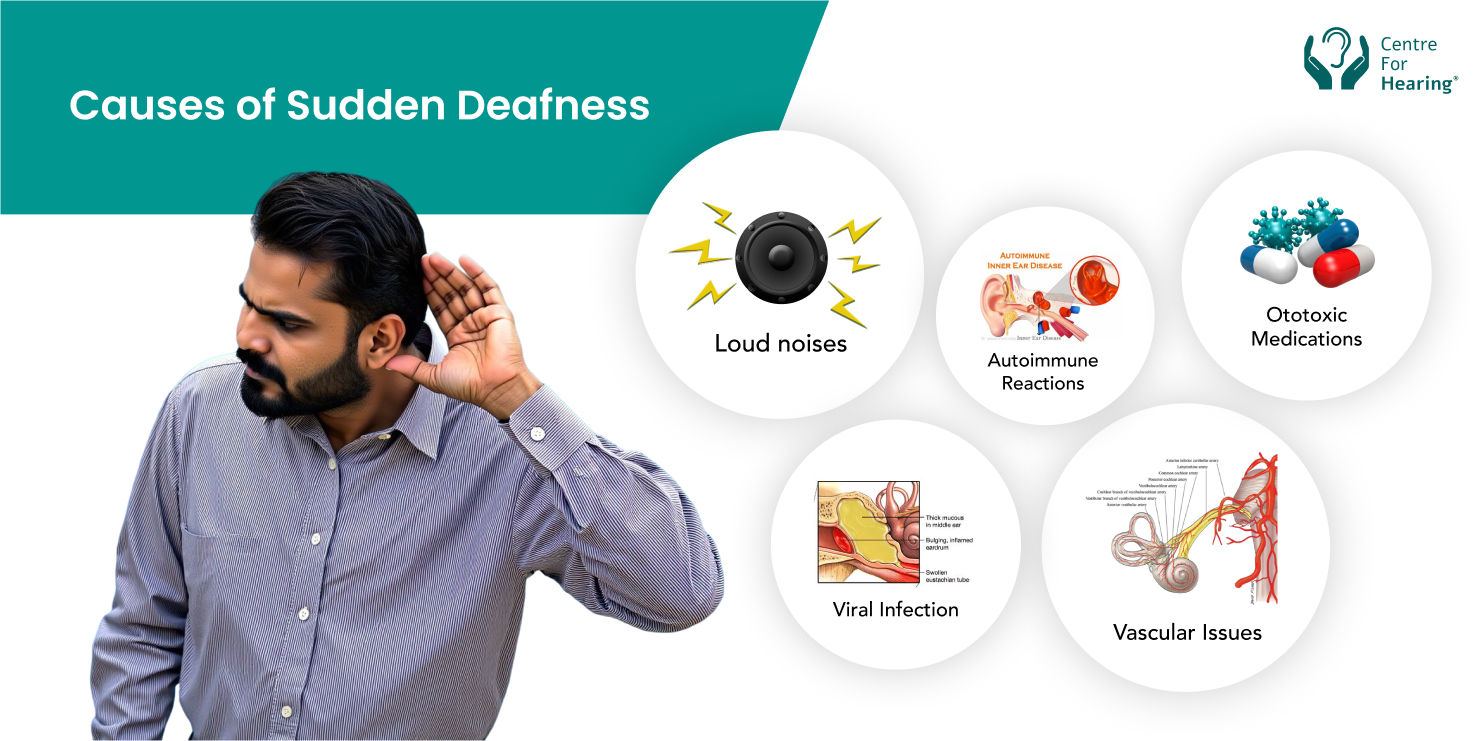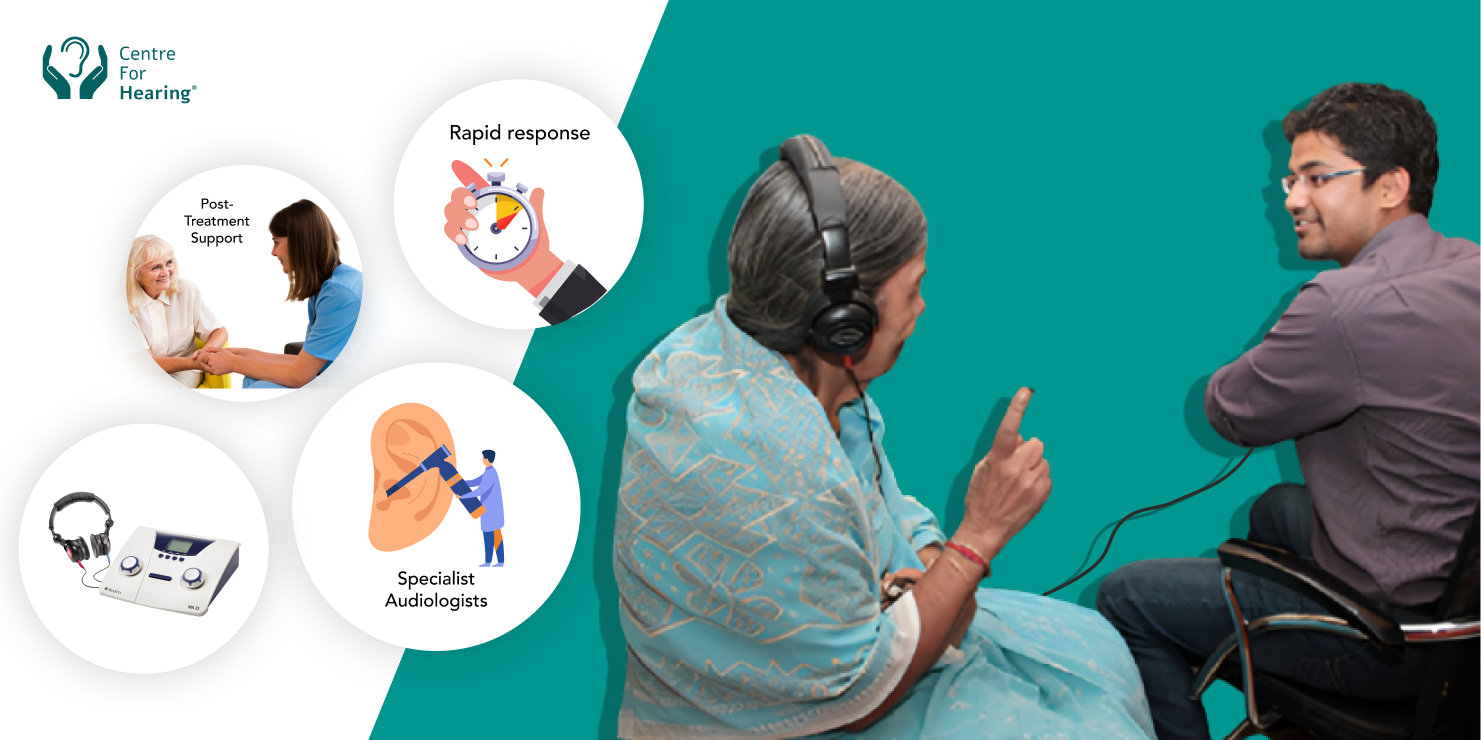At night, you go to bed feeling perfectly fine, but wake up to an eerily silent world on one side—your alarm sounds muffled, your partner’s voice seems distant, and an unsettling ringing in your ear.
No pain. No warning. Just silence where sound should be. This isn’t just a temporary inconvenience—it’s a medical emergency.
Sudden hearing loss strikes without warning and can permanently change your world in moments.
But here’s the critical part many miss: You have just 72 hours to act before your chances of recovery start dramatically declining. Every minute matters, and knowing what to do could save your hearing.
What is Sudden Hearing Loss and How to Recognise It?
Sudden sensorineural hearing loss (SSNHL) is defined as a rapid loss of hearing, at least 30 decibels—occurring within three days.
Unlike temporary hearing issues caused by wax blockages or middle ear infections, SSNHL affects the inner ear or neural pathways and can become permanent without swift intervention.
Common symptoms include:
- Hearing loss typically in one ear
- Tinnitus (ringing in the affected ear)
- A sensation of fullness in the ear
- Dizziness or balance problems
Why Sudden Hearing Loss Requires Immediate Action
When it comes to sudden hearing loss, time is of the essence. Research consistently shows that treatment within the first 72 hours offers the best chance for recovery.
Unfortunately, many people delay seeking help, thinking their hearing will return naturally or mistaking the symptoms for a simple ear blockage.
In India, studies show that over 70% of SSNHL patients seek treatment after five days—significantly reducing their chances of full recovery.
This delay often occurs due to low awareness about the condition’s urgency.
Common Causes of Sudden Hearing Loss Explained

While many cases remain unexplained (idiopathic), several potential causes include:
- Viral Infections: Viruses, such as those responsible for the common cold, herpes, or mumps, may attack the inner ear or auditory nerve, leading to inflammation and hearing impairment.
- Vascular Issues: A blockage or reduction in blood flow to the cochlea (the hearing organ in the inner ear) can result from blood clots, spasms, or other circulatory problems, depriving the ear of oxygen and causing hearing loss.
- Autoimmune Reactions: Conditions like autoimmune inner ear disease (AIED) can cause the body’s immune system to mistakenly attack the inner ear structures, leading to rapid hearing decline.
- Trauma: Physical injury to the head or ear, such as a blow to the skull or exposure to an extremely loud noise (acoustic trauma), can damage delicate inner ear components.
- Ototoxic Medications: Certain drugs, including some antibiotics, chemotherapy agents, or high doses of aspirin, can harm the auditory system as a side effect, sometimes triggering sudden hearing loss.
- Inner Ear Disorders: Conditions like Ménière’s disease, which affects fluid balance in the inner ear, may occasionally present with hearing loss as an early or isolated symptom.
In many instances, despite thorough investigation, the exact cause remains elusive, leading to a diagnosis of idiopathic SSNHL.
Sudden Hearing Loss: What Action Should You Take Immediately?
Here are the critical steps to take immediately:
1. Visit your nearest accessible ENT Doctor immediately
Contact a healthcare professional right away—ideally, an otolaryngologist (ENT) or, if unavailable, directly visit an audiologist for a hearing test. Time is critical; treatment within the first 48–72 hours often yields the best outcomes.
2. Get a Diagnostic Hearing Test performed
The important hearing test you will need is the Pure Tone Audiometry (PTA). This is performed at a cost of approx. Rs.800 to Rs.1,200 in different clinics.
Schedule a Hearing Test now – call 9811227269
Clinics in Chandigarh, Delhi, Gurugram, Dwarka, Jalandhar, Ludhiana, Patiala, Pathankot, etc.
3. Avoid Self-Diagnosis or Delay
Don’t assume it’s just wax buildup, a cold, or something minor that will resolve on its own. Sudden hearing loss can signal a medical emergency requiring prompt evaluation.
4. Note Symptoms and Timing
Before your appointment, jot down when the hearing loss started, whether it’s in one or both ears, and any accompanying symptoms (e.g., tinnitus, dizziness, ear fullness, or recent trauma).
5. Don’t Use Cotton Swabs or Ear Drops
Avoid trying to clean your ear or using over-the-counter remedies until a professional evaluates you. These could worsen the issue or complicate diagnosis.
5. Follow Medical Advice
If prescribed treatment (e.g., corticosteroids for inflammation), adhere to it strictly. Your doctor may also order tests like an audiogram (hearing test) or an MRI to pinpoint the cause.
What is the Diagnosis Process for Sudden Hearing Loss
Proper diagnosis involves several key assessments:
- Pure tone audiometry to measure the extent of hearing loss
- Tympanometry to evaluate middle ear function
- MRI scanning in some cases to rule out tumours or other structural causes
These tests help specialists determine the cause and appropriate treatment pathway.
What Are the Treatment Options for Sudden Hearing Loss?
Following a diagnosis of sudden hearing loss based on audiometric testing and other investigations performed by an otolaryngologist (ENT doctor), treatment may involve one or more of the following approaches:
Corticosteroids
This treatment is typically the initial medical approach. It can be delivered in two primary ways: orally, which is generally the preferred method, or transtympanically, involving a direct injection of the medication into the middle ear through the eardrum.
Hyperbaric Oxygen Therapy (HBOT)
It involves breathing pure oxygen within a pressurised chamber, and it may be recommended as an adjunctive treatment alongside corticosteroid therapy.
Management of Underlying Etiologies
It is essential in cases of SSNHL. Specifically, if it is determined to be a consequence of a distinct condition, such as a tumor, autoimmune disorder, or other identifiable cause, a focused treatment plan addressing that specific underlying condition will be initiated.
How to Prevent Sudden Hearing Loss
You can take steps to reduce the risk of known triggers and protect your hearing health. Here’s what you can do:
1. Protect Your Ears from Loud Noise
Exposure to loud sounds (e.g., concerts, machinery, or explosions) can cause acoustic trauma. Use earplugs or earmuffs in noisy environments, and keep the volume low when using headphones or earbuds (aim for the 60/60 rule: no more than 60% volume for 60 minutes at a time).
2. Manage Cardiovascular Health
Since vascular issues like poor blood flow can contribute to SHL, maintain a healthy lifestyle: eat a balanced diet, exercise regularly, avoid smoking, and control conditions like high blood pressure, diabetes, or high cholesterol with medical guidance.
3. Be Cautious with Medications
Some drugs (ototoxic ones, like certain antibiotics or chemotherapy agents) can harm hearing. Always discuss potential side effects with your doctor, and never exceed recommended doses of medications like aspirin.
4. Stay on Top of Infections
Viral infections may trigger SHL, so practice good hygiene (e.g., handwashing) to reduce your risk of colds or other illnesses. If you suspect an ear infection, seek treatment promptly to prevent complications.
5. Monitor Autoimmune or Chronic Conditions
If you have an autoimmune disease or a condition like Ménière’s disease, work with your doctor to manage it effectively, as flare-ups could increase SHL risk.
6. Get Regular Hearing Checkups
Routine hearing tests can catch gradual changes before they become sudden problems, especially if you’re at higher risk (e.g., older age, family history of hearing issues, or frequent noise exposure).
While these steps can lower the odds of preventable causes, hearing loss can still occur unexpectedly.
Check-Ups to Prevent Sudden Hearing Loss: Why Choose Centre for Hearing®

When facing sudden hearing loss, choosing the right care provider can make all the difference. Centre for Hearing® stands apart for several important reasons:
- Rapid Response Protocol: Our clinics prioritise hearing loss cases, ensuring you receive a same-day assessment during this critical window.
- Specialist Audiologists: Our team includes audiologists specifically trained in emergency hearing situations who can differentiate between sudden sensorineural hearing loss and other conditions.
- Advanced Diagnostic Equipment: We utilise comprehensive testing equipment to accurately diagnose the type and degree of hearing loss, guiding appropriate treatment.
- ENT Partnership Network: We maintain relationships with leading ENT specialists across India, facilitating seamless referrals when medical intervention is required.
- Post-Treatment Support: Should you experience residual hearing loss, our specialists can provide rehabilitation solutions, including advanced hearing technology.
- Multiple Locations: With centres across major cities in India—Mumbai, Gurgaon, Delhi, Punjab (Ludhiana, Patiala, Jalandhar, Chandigarh Tricity – Chandigarh, Mohali, Panchkula) —, we provide accessible care for sudden hearing loss.
You can also chat with us on WhatsApp or call us ͏at +91 9811227͏2͏69.
Watch the video to learn more:
FAQs
1. What exactly is sudden sensorineural hearing loss (SSNHL)?
Think of it as your inner ear or hearing nerve suddenly “switching off.” It’s a rapid hearing loss—at least 30 decibels—happening within just 72 hours. Unlike when your ear feels blocked from wax, SSNHL is a genuine medical emergency that needs immediate attention to prevent permanent damage.
2. Can sudden hearing loss recover on its own without treatment?
While some mild cases might improve spontaneously, most don’t fully recover without proper medical intervention. Starting treatment within those first 72 hours dramatically increases your chances of getting your hearing back. Don’t gamble with the “wait and see” approach when it comes to hearing loss.
3. How is sudden hearing loss different from normal age-related hearing decline?
Age-related hearing loss happens gradually over years and typically affects both ears equally. Sudden hearing loss occurs dramatically—often overnight—and usually affects just one ear. The urgency is completely different, with hearing loss requiring emergency attention within days, not months.
4. What tests will be performed to diagnose sudden hearing loss?
Diagnosis typically involves an audiogram (a hearing “map” across different frequencies), tests to check middle ear function, and possibly measurements of inner ear response. Some patients might need an MRI to rule out structural issues. At Centre for Hearing®, we provide comprehensive testing to accurately identify sudden hearing loss.
5. Does sudden hearing loss always cause complete deafness in the affected ear?
Not at all! The severity varies considerably—some experience just mild muffling, while others have more significant loss. Even mild, sudden hearing loss deserves immediate attention. The degree of loss and how quickly you start treatment both play major roles in your recovery outlook.
6. Can stress or anxiety cause sudden hearing loss?
While stress can worsen tinnitus and other hearing discomfort, genuine sudden sensorineural hearing loss is rarely caused directly by stress alone. However, if you notice any sudden hearing changes, don’t simply attribute them to stress—get checked properly to rule out SSNHL.
7. If I’ve experienced sudden hearing loss once, am I likely to have it again?
Recurrent episodes are uncommon—only about 2-5% of people who’ve had sudden hearing loss experience it again. If you’ve had an episode before, Centre for Hearing® can help you monitor your hearing health closely to catch any future issues immediately.
Final Note: When to Seek Help for Sudden Hearing Loss
Remember: When it comes to hearing loss, every hour counts. Early intervention gives you the best chance of preserving your hearing for the future.
Don’t wait for symptoms to worsen or “settle on their own”—sudden hearing loss requires immediate professional attention.
Centre for Hearing® provides comprehensive hearing healthcare across India, with specialist audiologists trained to handle sudden hearing loss emergencies.
If you experience sudden changes in your hearing, contact your nearest Centre for Hearing® clinic for immediate assistance.
To book your ͏free consultation today, you can call us ͏at +91 9811227͏2͏69 or email us at care@ce͏ntrefor͏hearing.com.
Locate a Hearing Aids Centre Near You:

